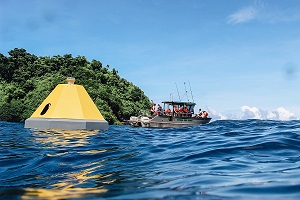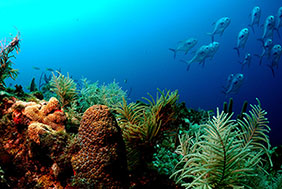-
Home
-
Data & Publications
-
Regional Portals
- About Regional Portals
- Florida
- Navassa Island
- Puerto Rico
- Flower Garden Banks
- U.S. Virgin Islands
- American Samoa
- Commonwealth of the Northern Mariana Islands
- Federated States of Micronesia
- Guam
- Main Hawaiian Islands
- Republic of the Marshall Islands
- Northwestern Hawaiian Islands
- Republic of Palau
- Pacific Remote Island Areas
-
CRCP Activities
- Glossary
National Coral Reef Monitoring Program:
Monitoring Climate-Driven Impacts

A changing climate is impacting the nation’s coral reef ecosystems. Increases in ocean temperature and changes to ocean chemistry are causing widespread coral bleaching, more frequent disease, and reduced coral growth rates. Key indicators used to identify and monitor climate-driven trends are listed below.
- Thermal stress - changes in sea temperature
- Ocean acidification - changes in carbonate chemistry
- Ecological impacts - data on coral growth rates, erosion, and community structure to understand impacts of thermal stress and ocean acidification on the ecosystem
Data collection methods include moored oceanographic and ecological instruments stationed at fixed points in the Atlantic and Pacific Oceans, water samples collected by divers, and satellite-based observations.
These extensive monitoring data provide a comprehensive view of climate change impacts on coral reef ecosystems and help identify areas of resilience and vulnerability. The data are also used in modeling efforts.
Partners
- NOAA’s Atlantic Oceanographic Meteorological Laboratory (AOML)
- NMFS Pacific Islands Fisheries Science Center (PIFSC)
Field Reports
- St. Thomas and St. John, USVI: Climate Monitoring Brief 2023
- Flower Garden Banks: Climate Monitoring Brief 2022
- St. Croix, USVI: Climate Monitoring Brief 2022
- Dry Tortugas National Park: Climate Monitoring Brief 2021
- Oahu: Ocean and Climate Change Team Mission Report 2021
- Mariana Islands Mission Report 2022
Outreach Products
Recent Technical and Peer Reviewed Publications
- 2016 Annual Summaries of Coral Bleaching Conditions for U.S. NCRMP jurisdictions
- Enochs IC, Manzello DP, Carlton R, Schopmeyer S, van Hooidonk R, Lirman D (2014) Effects of light and elevated pCO2 on the growth and photochemical efficiency of Acropora cervicornis. Coral
Reefs 33(2):477-485, doi: 10.1007/s00338-014-1132-7 - DeCarlo TM, Cohen AL, Barkley HC, Cobban Q, Young C, Shamberger KE, Brainard RE, and Golbuu Y (2015) Coral macrobioerosion is accelerated by ocean acidification and nutrients. Geology
43 (1): 7-10, doi: 10.1130/G36147.1 - Heron, SF, Liu G, Rauenzahn JL, Christensen TRL, Skirving WJ, Burgess TFR, Eakin CM, Morgan JA. (2014) Improvements to and Continuity of Operational Global Thermal Stress Monitoring for Coral Bleaching, Journal of Operational Oceanography 7(2): 3-11, doi: 10.1080/1755876X.2014.11020154
- Anthony, KRN, Marshall PA, Abdullah A, Beeden R, Bergh C, Black R, Eakin CM, Game ET, Gooch M, Graham NAJ, Green A, Heron SF, van Hooidonk R, Knowland C, Mangubhai S, Marshall N, Maynard JA, McGinnity P, McLeod E, Mumby PJ, Nyström M, Obura D, Oliver J, Possingham HP, Pressey RL, Rowlands GP, Tamelander J, Wachenfeld D, Wear S (2014) Operationalising resilience for adaptive coral reef management under global environmental change, Global Change Biology, doi: 10.1111/gcb.12700.
Complete list of publications produced by the NCRMP Climate Assessment Team.
Data Collections
Supporting Documentation (Please note this encompasses only a subset of documentation for the submitted data. Contact the data providers with further questions.)
- Coral Reef Watch - Satellite Monitoring
- Climate Monitoring Stations - Water Chemistry
- Shallow Water CTD Profiles (Pacific)
- Subsurface Temperature Recorders
- Calcification Accretion Units
- Carbonate Budget Data (Atlantic)
- Cryptic Reef Diversity of Marine Invertebrates (Pacific)
- Calcification data derived from coral cores (Atlantic)
- Photomosaics obtained at Climate Stations (Atlantic)
MAPCO2 Moorings (Carbon Dioxide time-series observations)
- Real-Time Preliminary Data
- Finalized Data
- Cheeca Rocks, FL
- La Parguera, PR
- Kaneohe Bay, HI
- Kaneohe Bay, HI (CRIMP1 and CRIMP2)


